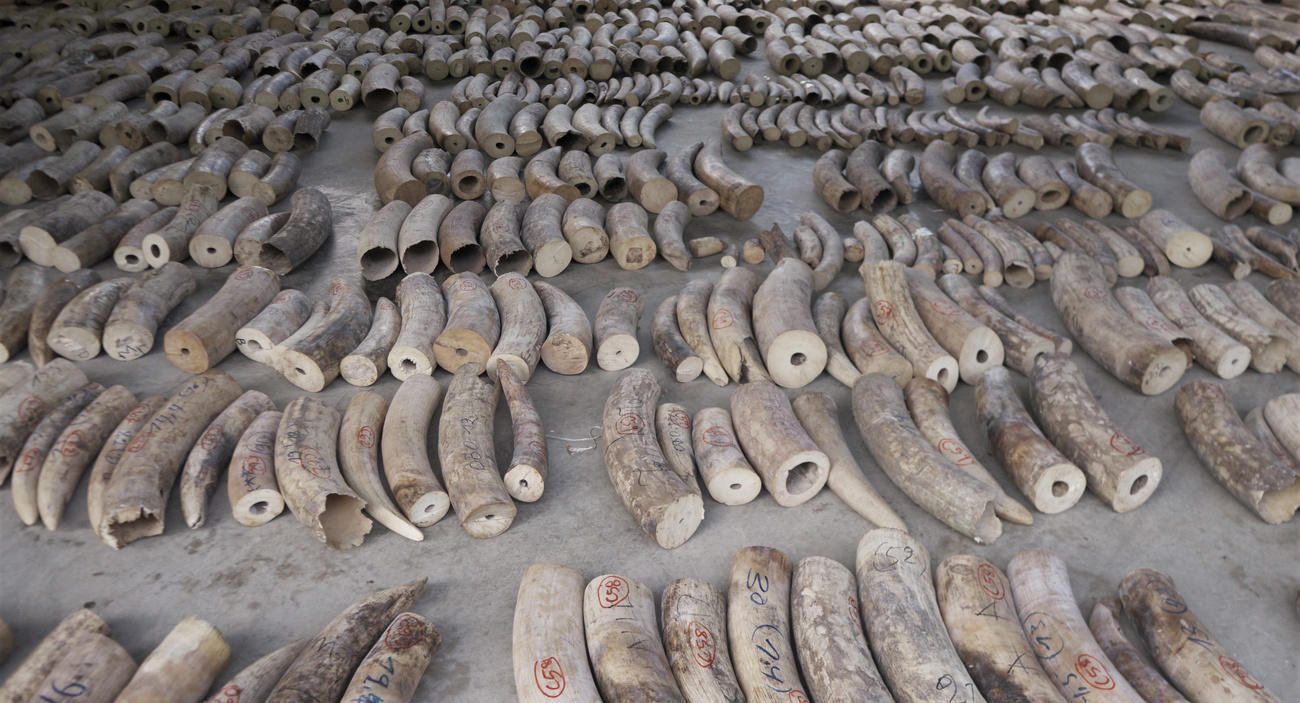
Nations tighten rules on trading protected animals and plants

States meeting in Geneva to discuss the global wildlife trade have agreed to strengthen protections on a range of different species from giraffes to mako sharks.
The World Wildlife Conference, known formally as CoP18 of the Convention on International Trade in Endangered Species of Wild Fauna and FloraExternal link (CITES), wrapped up its 11-day meeting on Wednesday.
“A large number of species were added to appendixes 1-2 [the convention’s lists of species threatened with extinction or attributed certain special conservation protections], and many documents were approved by consensus showing that CITES is working well,” declared CITES Secretary-General Ivonne Higuero.
Among the more emblematic animals, states voted overwhelmingly to regulate the global trade in giraffes, overcoming objections by southern African states. The African giraffe population has declined by about 40% in 30 years and now numbers less than 100,000 animals, according to the International Union for Conservation of NatureExternal link (IUCN).
More than 36,000 species are currently protected by the convention, signed in 1973 in Washington. CITES, which brings together 183 state parties, bans trade in some products entirely, while permitting international trade in other species provided it doesn’t hurt their numbers in the wild. Switzerland ratified the treaty in 1974 and is the depositary state and host of the CITESExternal link Secretariat, based in Geneva.
Countries also rejected proposals to relax restrictions on the hunting and exporting of white rhinos and agreed to limit the sale of wild elephants caught in Zimbabwe and Botswana. A proposal by Botswana, Namibia and Zimbabwe to be allowed to sell government-owned ivory stockpiles – a one-time sale followed by a six-year moratorium – was also voted down.
Frustrated
Southern African nations – Namibia, Zimbabwe, South Africa, Botswana, Mozambique and Tanzania – were unhappy with these decisions. Namibian Minister of Environment and Tourism Pohamba Shifeta said in Geneva on Tuesday that Namibia would convene a meeting with other Southern African Development CommunityExternal link (SADC) member states to consider withdrawing from CITES.
Among other decisions, several marine species also received special CITES protection status, including 18 more shark species like the blacknose and sharpnose guitarfish, and shortfin and longfin mako sharks. Other marine species, such as eels, teatfish (sea cucumber), queen conch, marine turtles, precious corals, sturgeons and seahorses, were also addressed at the meeting.
The conference amended an earlier Appendix II listing of rosewoods and related tree species to ensure that small finished items, including musical instruments, parts and accessories, could be carried across borders without the need for CITES permits.
“Significant implications”
NGOs generally welcomed the outcomes. WWFExternal link said decisions taken in Geneva had “significant implications for the futures of thousands of animal and plant species around the world”.
Mathias Lörtscher, who led the Swiss government delegation, also felt the conference had been a success.
“Overall, it shows that the convention really works. We had over 100 working documents and 57 proposals and for the most part we were able to agree with consensus,” declared the head of species conservation at the Swiss Federal Food Safety and Veterinary OfficeExternal link.
While he was pleased with the status quo regarding elephants and rhinos, the Swiss official said a solution needed to be found to resolve the fundamental long-running divide with southern African states around proposals concerning these species.
“The situation is getting worse. I understand these parties, as they have stable or increasing populations of those animals which are in the worldwide focus and where there is so much public pressure,” he told swissinfo.ch.
Lörtscher said he was also pleased that most marine species proposals had been adopted.
“These are species traded in large volumes and have been neglected in CITES and are now coming more into focus and can benefit from CITES processes to make sure their use becomes sustainable,” he said.
A Swiss proposal calling for research into the sustainable trade in tropical fish was also adopted by consensus.

More
Swiss expert warns over lucrative illegal wildlife trade

In compliance with the JTI standards
More: SWI swissinfo.ch certified by the Journalism Trust Initiative





























You can find an overview of ongoing debates with our journalists here . Please join us!
If you want to start a conversation about a topic raised in this article or want to report factual errors, email us at english@swissinfo.ch.